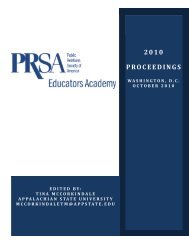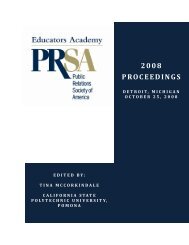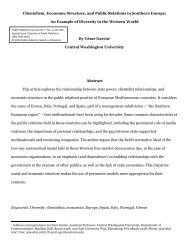2012 PROCEEDINGS - Public Relations Society of America
2012 PROCEEDINGS - Public Relations Society of America
2012 PROCEEDINGS - Public Relations Society of America
You also want an ePaper? Increase the reach of your titles
YUMPU automatically turns print PDFs into web optimized ePapers that Google loves.
January <strong>2012</strong> study as were the qualities <strong>of</strong> excellent leadership the respondents most likely<br />
exhibit in their role as PRSSA faculty adviser (Meng et al, <strong>2012</strong>). Using a five-point Likert scale<br />
from very unlikely to very likely, respondents rated the following qualities: ability to<br />
demonstrate the value <strong>of</strong> public relations, an organizational culture which supports<br />
communication, ability to solve problems and produce results, being trustworthy and dependable,<br />
being visionary and inspiring, communication knowledge and expertise, ethical values and<br />
orientation, relationship-building abilities, strategic decision making capability, and team<br />
collaboration ability.<br />
A five-point Likert scale from strongly disagree to strongly agree was used to measure<br />
the extent to which respondents agreed that students develop leadership skills through each <strong>of</strong> 17<br />
items or PRSSA activities: membership in PRSSA, attendance at PRSSA chapter events, PRSSA<br />
chapter leadership (<strong>of</strong>ficer or member <strong>of</strong> chapter executive board), leadership <strong>of</strong> a student-run<br />
firm, participation in a student-run firm, hosting an annual PRSSA regional activity, attendance<br />
at a regional PRSSA activity, attendance at the national PRSSA conference, Bateman team<br />
participation, Bateman team leadership, participation on a Finalist Bateman team, participation<br />
on an Honorably Mention Bateman team, receiving a national PRSSA scholarship, attendance at<br />
a PRSSA Leadership Rally, attendance at a PRSSA National Assembly, and service as a<br />
National Committee member.<br />
For these same 17 items, respondents were asked about the extent to which they track<br />
students after graduation and whether they believe students who have participated in these 17<br />
activities are likely to exhibit leadership qualities in the workplace or their communities after<br />
graduation. The survey also included a subset <strong>of</strong> questions for faculty advisers <strong>of</strong> the Bateman<br />
Case Study Competition. Forty <strong>of</strong> the 126 respondents indicated that they had advised at least<br />
one Bateman team in the past. Forty represents about half (51%) <strong>of</strong> the average total number <strong>of</strong><br />
advisers (79) who have submitted a Bateman intent-to enter form over the past 10 years,<br />
according to the PRSSA Manager <strong>of</strong> Student Programs. It should be noted, however, that the<br />
number <strong>of</strong> actual submissions every year is at least 10-25% lower than the number <strong>of</strong> teams who<br />
submit the intent-to-enter form. For example, 94 teams submitted intent-to-enter forms this year,<br />
but only 70 actually submitted the entry in March.<br />
Among the questions for the subset <strong>of</strong> faculty advisers who had advised Bateman teams<br />
were:<br />
1. How likely are you to exhibit the following qualities (the same 10 qualities as listed in the<br />
question for all PRSSA faculty advisers) <strong>of</strong> excellent leadership in your role as faculty adviser to<br />
your chapter‘s Bateman Case Study Competition team?<br />
2. To what extent are the following experiences required for students to participate in PRSSA<br />
Bateman teams that you advise? Bateman faculty advisers were asked to respond to a five-point<br />
Likert scale (very little extent to very great extent) about these seven experiences: Formal<br />
leadership training, participation in student organizations other than PRSSA, leadership <strong>of</strong><br />
student organizations, internship or other work experience, service-learning experience,<br />
academic excellence, and combination <strong>of</strong> two or more <strong>of</strong> the above mentioned experiences.<br />
3. What most closely represents your role in the formation <strong>of</strong> your PRSSA Bateman team(s) for<br />
your chapter? Respondents selected one answer among: I decide, I decide with our team‘s<br />
pr<strong>of</strong>essional adviser, I decide along with a review panel including students, I have no role.<br />
Students select the team.<br />
This study was funded with a research grant from the Plank Center.<br />
150
















